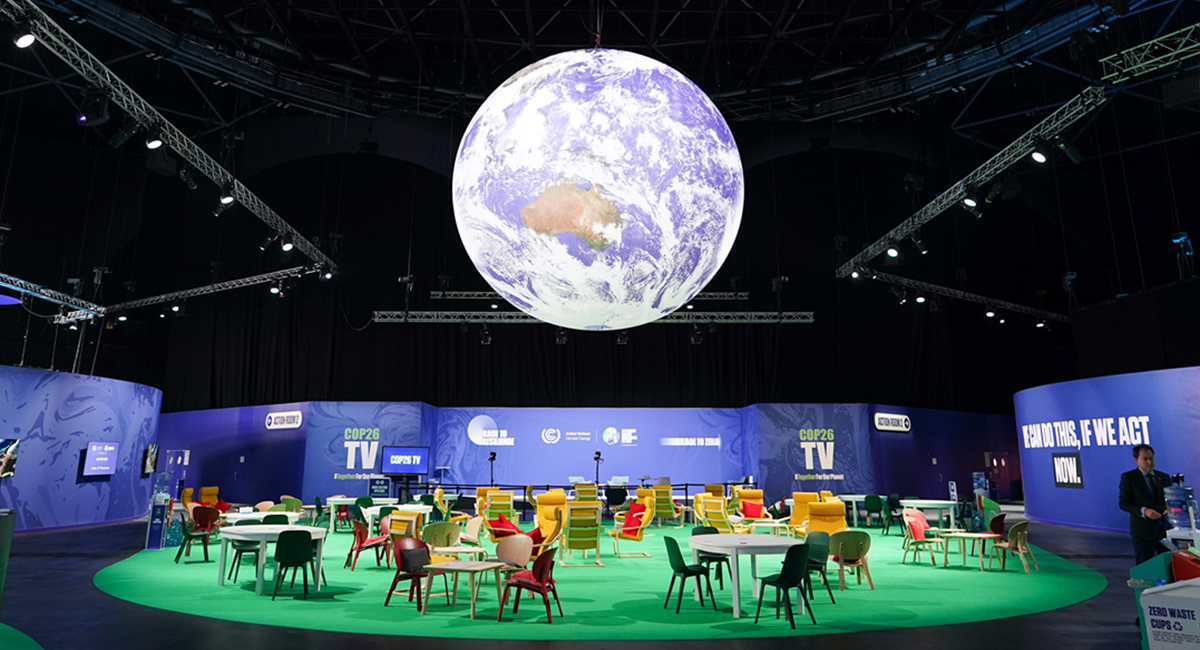
Billed as our “last best chance” to manage global warming, COP26 in Glasgow brought together signatories to the Paris Climate Agreement and UN Framework Convention on Climate Change to accelerate action toward shared climate goals.
AIA sent its first official delegation to COP26 to raise awareness of the role of the building sector, to connect with decision-makers and partner organizations, and to advocate for policies that support decarbonization and adaptation.
While delegates representing 200 nations reached landmark agreements to curb methane emissions and halt deforestation, most headlines are focusing on aspects of the final agreement that fell short, including provisions to phase out fossil fuels and to provide financial assistance to nations bearing the brunt of climate impacts.
In a statement, United Nations Secretary General António Guterres expressed the consensus view that the agreement may not represent a leap forward, but it is an important step forward: “We must end fossil fuel subsidies, phase out coal, put a price on carbon, protect vulnerable communities from the impacts of climate change, and make good on the $100 billion climate finance commitment to support developing countries. We did not achieve these goals at this conference, but we have some building blocks for progress.”
As world leaders hammered out the agreement, stakeholders gathered at panels, events, and pavilions attended by the UN, NGOs, and government leaders. Speaking at events, forging partnerships, and conversing with public officials, AIA’s delegation ensured the profession’s voice was represented.
“I started 2020 thinking about architects as first adapters, as indispensable partners whenever health and wellness must be balanced against delight and inspiration in the places where we live our lives,” said AIA President Peter Exley, FAIA, in remarks at a panel event. “However, unless we’re at the proverbial table for the critical discussions about codes, zoning, material pipelines, land use, evaluating carbon taxes, creating carbon sinks, circular economies, and so much more–unless we’re at the table for those critical discussions, then architects have abjured their agency. It’s up to us to be true agents of climate action.”
Another delegate member, Julie Hiromoto, FAIA, delivered remarks about AIA’s priorities at an open meeting with official COP delegates. Hiromoto, HKS Principal and COTE 2020 Advisory Group Chair, stated: “Our buildings are millions of square feet all over the globe. And if we can influence the design and the space that we occupy for a low-carbon future and economy in a just, equitable, sustainable, and healthy way, then we’re on the right track.”
AIA’s delegation–which also included Mike Davis, FAIA, AIA Government Advocacy Committee Chair; and Dr. Mark Breeze, AIA, AIA U.K. Sustainability Chair–spoke directly with a number of U.S. members of Congress, cabinet members, mayors, environmental leaders, and partner organizations.
The role of buildings in climate change had elevated prominence at COP26. The profession was well-represented at Cities, Regions and Built Environment Day, coordinated by the World Green Building Council. The COP26 Buildings Pavilion and the Resilience Hub also provided a focal point for AIA’s priority issues.
Built environment programming permeated the entire 12 days–with city and state action taking centerstage at C40 Cities’ “Climate Breakfast with Mayors.” The AIA delegation attended this event, which drew mayors from around the world to consider the role of cities in climate action.
“Our mayors were heroic for staying in after the U.S. pulled out [of the Paris Climate Agreement],” commented John Kerry at the event. “That effort kept the U.S. relatively close to our climate goals. This shows the power and importance of grassroots localized decision making.”
Leading up to COP26, AIA joined Architecture 2030 and dozens of organizations and firms to issue a Communiqué to government leaders challenging them to step up their emissions reduction targets for the built environment.
The AIA delegation advocated this position throughout COP26, underlining the profession’s commitment to creating a zero-carbon built environment.
Summing up the delegation’s focus, Peter Exley stated:
“We need to treat the Greta Thunbergs of the world as more than just a voice. We need to mobilize a generation of Gretas and give them the resources and education so there’s some warranty to the promises we make here at COP 26. As an architect, I can embody a design ethic, just as Greta Thunberg embodies a movement.”